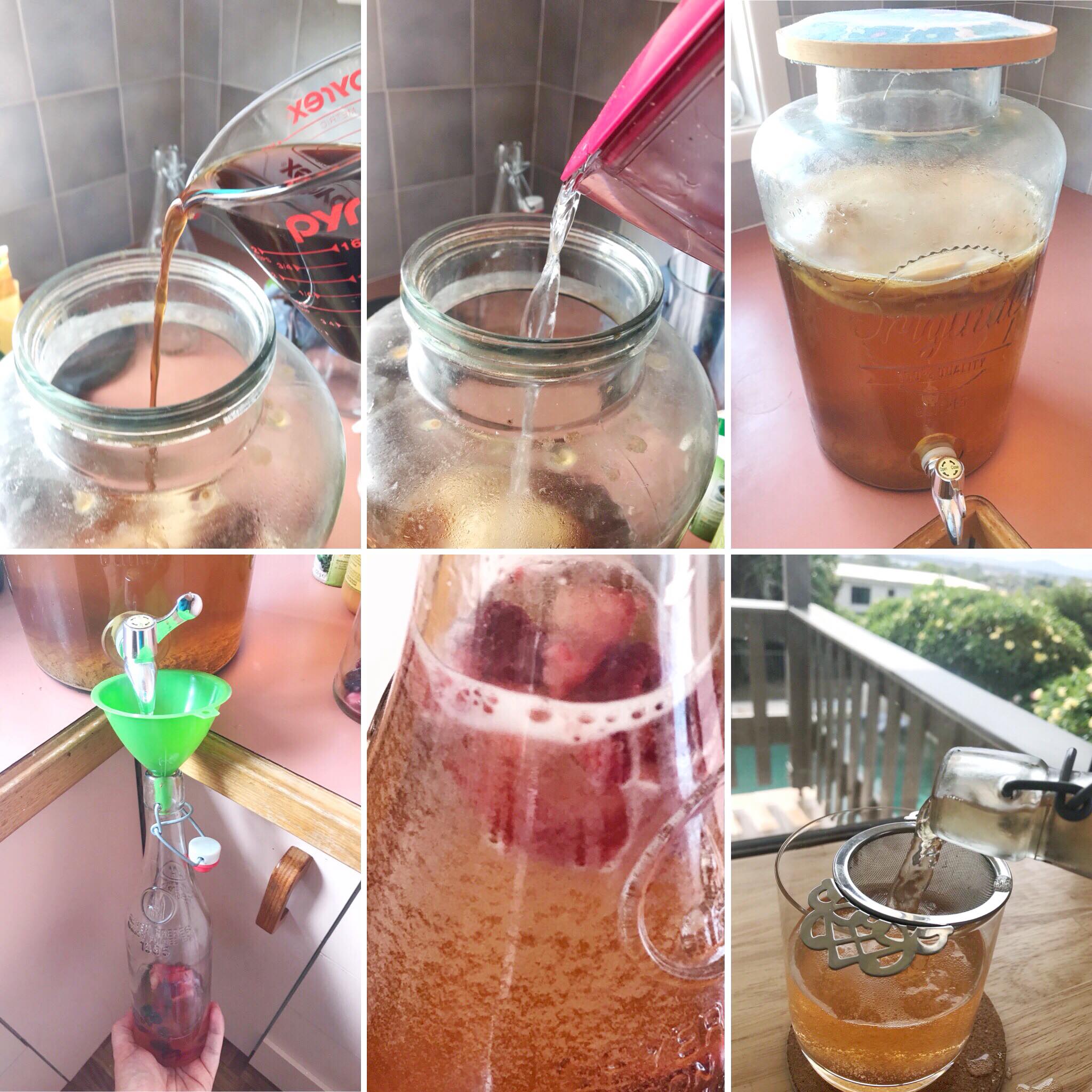Kombucha guide
Kombucha is honestly fascinating.
It has become supremely topical in it’s commercialisation and popularity, while also being an incredible process in that it is created via a live and expanding bacterial culture.
It may have sound a little faddish at times and popular in the ‘woo’ crowds, however kombucha can actually serve as a probiotic boost to your current intake. Those really big ‘cure-all’ claims though? Completely unfounded unfortunately!
So What is Kombucha?
Kombucha is a fermented tea created by brewing tea, adding sugar and allowing to ferment with the aid of a bacterial and yeast culture – called a SCOBY (Symbolic Culture of Bacteria & Yeast).
Due to the fermentation process, kombucha will contain a small amount of alcohol (so take note if you are on your P Plates not to overdo consumption!).
How Healthy is It?
Although it gets some air-time as being a ‘cure-all’ for a range of illnesses and an ‘immortal health elixir’, there really is no evidence to back this up and it is likely a whole lot of quakery.
However, there are some health benefits stemming from it’s probiotic properties (the good gut bacteria). To help in maintaining a healthy gut and all the positives that come along with it, enjoying 2-3 serves of probiotic rich foods daily is something to consider. This could include yoghurt, kefir, kombucha, fermented veggies/sauerkraut.
Now it is important to note that it is only the raw/unpasteurised kombucha that contains these probiotics. If you are drinking kombucha made in unsanitary conditions, this is a known risk – so if you are pregnant or with a compromised immune system, it is worth weighing up the risks and likely best to leave kombucha out for now.
This also highlights the need to keep food safety front of mind when making a batch of kombucha at home to prevent contamination.
Is the Commercial Bottles as Good as Home-Brewed?
As commercialised kombucha needs to be pasteurised to extend it’s shelf life and prevent excessive alcohol contents, many brands do not actually contain the probiotics that actually gives kombucha it’s purpose. So if you are choosing one commercially, go for an option that requires refrigeration as these are more likely to not have been pasteurised.
Also, let’s talk money!
The cost of the commercial products range in price from $9-$14 per litre. While making it at home (with a donated SCOBY) only cost us the price of 8 teabags and 1 cup of sugar – working out at ~$0.15c per litre (~60c for 4 litres)!
So Should You Drink It?
Although this drink is not a cure-all and most certainly not an essential, it is a great low sugar alternative compared with soft drinks and it does offer a nice dose of probiotics. So if you like the taste, and are sure to be consuming it from a safe source – go for it!
Our How To Guide
Firstly, a massive thanks to our gorgeous friend Heather Fitzhardinge for helping us out with writing this and a big thank you to Carmel for donating us a SCOBY!
Ingredients
8 teabags – You can use all green or a mix of half black, half green
1 Cup sugar
1 SCOBY *
2 cups starter tea (this is already brewed Kombucha)
Water to make up to 4 litres **
Large glass Jar (over 4 litres)
Vinegar
Bottles (flip top bottles work well)
Fruit or juice to flavour
Method:
- Clean your glass jar with soap and water and then rinse it out with vinegar (basically anything that comes in contact with your kombucha you want to rinse with vinegar first to prevent contamination.
- Place your SCOBY and starter tea in your large jar.
- Boil the kettle and pour approx. 2 cups of the water over your teabags. Let brew for 10 minutes.
- After 10 min, remove the tea bags and pour in 1 cup sugar and stir until dissolved. Leave to cool to room temperature.
- Once cooled to room temp, pour into your jar and top up with water until it reaches 4 litres.
- Cover with a cloth (eg tea towel, muslin) so that it can breathe, but flies can’t get in.
- Let the tea sit for at least 5 days (I usually go a week to make it easy on weekends). The longer you leave it, the more vinegary it will be, and the stronger it will be in terms of probiotics (but also alcohol!). In summer it will ferment quicker than in winter.
- A new SCOBY will form over the top of the old one during each batch you make.
Decanting the kombucha for an optional ‘second brew’:
- Once you are happy with the taste, you can drink it straight from the container or most people prefer a second ferment.
- While decanting leave the SCOBY in the jar with approximately 2 cups of the liquid – as this will make your starter tea again.
- To do a second ferment, place your choice of fruit/and or juice in your bottles, (I usually do enough fruit to just cover the bottom of the bottle or 1 cm of juice).
- Then fill the bottle with the brewed Kombucha. Let it sit at room temperature for a couple of days and place in the fridge. It will get a bit fizzy and depending which fruits you use, some batched will be fizzier than other. (Watermelon is particularly fizzy)
NOTES:
* You can buy SCOBYs online, but the best thing to do will be to ask around and I am sure you will find someone local to give you one along with some starter tea.
** You can scale this recipe up and down depending on how much you want to make. You can make this in any size jar you like.


ALICIA EDGE HEAD SPORTS DIETITIAN
Alicia is the head Advanced Sports Dietitian at Compeat Nutrition. She is also a mum and triathlete, so advice extends beyond the basics and is instead focused on providing effective and achievable nutrition for both training and racing.